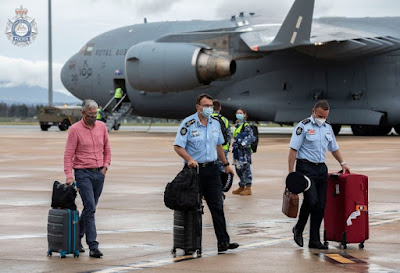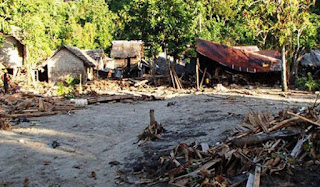NO GAIN WITHOUT PAIN
BY GEORGINA KEKEA
Coming from the same recruiting agency, they both say having the support of fellow peers is important while overseas.
SOLOMON Islanders continue to benefit from
the Seasonal Workers Scheme (SWS) in Australia. Since its establishment in
2012, the number of farm workers from Solomon Islands has more than doubled from
42 in 2012 to 87 in 2017.
The most common goal of these workers is to
have a house, a decent living and to be able to support their family. From a
village close to Tambea, Joseph Cheka is a new dad. He left home in March this
year (2018) to work under the SWS in Australia leaving behind his six month old
child and new wife.
The daunting future of not having a roof
over their head drove Joseph to leave his home to earn money for his family.
“I used to sell copra. I started the
foundation of my house through selling copra. At that time, a bag of copra was
SBD$4.00 per kilo. You can imagine how much hard work I have to go through in
order to save money. I used to earn SBD$400.00 at the most per market”.
Drying coconut to make copra takes time.
The method used for most rural Solomon Islanders is drying where the kernel or
coconut meat is left in the sun to dry.
It can takea week at the most to dry the coconut. Prior to that, they
have to collect the coconut fruits, remove the husks and then remove the kernel
to be left out to dry.
Depending on the
amount of coconut dried, a villager can get SBD$400.00 to SBD$700.00 (AUD$70.00
to AUD$120.00) a fortnight.
By working in Australia, a villager can
earn an estimated AUD$1000 per week (SBD$5650 a week) after deductions.
“So now I am back in the country, I will
continue to work on my house. All I want is a permanent house with good
sanitation facilities”, Cheka said.
Sharing the same sentiment is mother of four,
Freda Sikwae. Her eldest son is already a teenager. Freda grew up at Kakabona and
still lives there.
“I used to be a market vender. That’s all I
do. But I feel that I have gained nothing out of it since I am only living for
today. I want my children to have a future that includes having a good home and
house to stay in. That was why I have to leave my children no matter the time
frame”.
For Freda this is the first time she has
left her family behind for a long time. She said it was hard at first but then
she started to settle in and things got better.
Freda worked in Gin Gin a town in
Queensland where she was responsible for classifying the fruits according to
the different grades. She said her responsibility was enormous because one
slight mistake can damage the company’s quality control. She said she had to learn on the job, a task
she found easy to do. She said in between the eight hours work, she also had 30
minutes break in two hour intervals over the day.
For Cheka, his job is picking citrus fruits
on a farm in Mildura in Victoria in south-east Australia
“In comparison to copra, this is easy. The weather is conducive since it is way
cooler then the stifling heat here in our country. So no matter what, I enjoyed
my job and I am thankful for the opportunity”.
For them, communication is not a problem. Freda speaks to
her children each day via the Facebook Messenger app and feels close to them
despite the distance. She said it brightens her day when she talks to her
children and it gives her hope to continue work each day.
For Joseph, he only speaks to his family occasionally.
Telecommunications are a problem where they live so he can only speak to his
family once they go to the nearest town. Like Freda, his family also
communicated with him using Messenger.
“We are lucky in Australia because they
provide free Wi-Fi where we were lodged unlike my family, they have to buy data
in order for them to talk to me. And this happens only when they come into
town”, Cheka said.
Back in Solomon Islands, Cheka is happy
just to be with his wife, baby and extended family.
Over the six-month stint, they are working
on fulfilling their dream. Cheka said he will continue to build his house, while
Freda is working on building another house for her family.
“We have a house already, but I want
another one where I can put out for rent since housing is a problem in the
country. Once complete, I can then put out for rent and my children’s future is
secure”, Freda said.
Though at times they send money back home
for urgent needs, there is still enough left that they have saved.
Coming from the same recruiting agency, they both say having the support of fellow peers is important while overseas.
It was their first time overseas and it
definitely won’t be the last.
“I am now an expert in maneuvering through
the airport and customs. Something which I was quite fearful of when I first
stepped on Australian soil”, Cheka said.
For Freda she said she got through each day
by being thankful that her children are safe and not being harmed or ill.
“The six months went by very fast when one
is being kept busy. We have no time to go out socializing. We get up at 4am for
an hour’s drive to our work place. By the time we get home, it will be night
and we only want to rest”.
ENDS///





Comments
Post a Comment